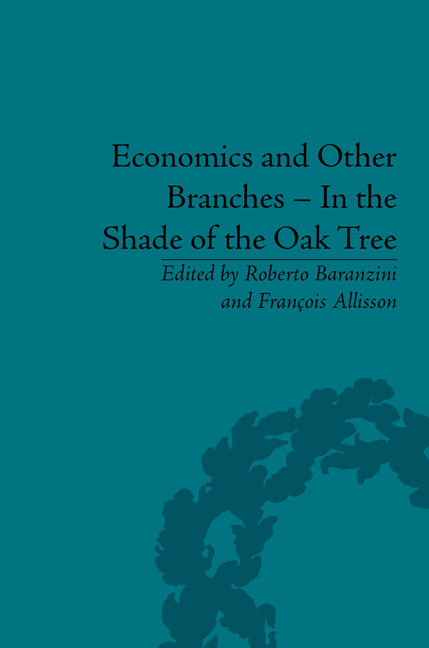Book contents
- Frontmatter
- CONTENTS
- List of Contributors
- List of Figures and Tables
- Introduction
- Pascal Bridel's Bibliography (up to 2013)
- Part I Léon Walras's Economic Thought
- Part II The Spreading of Thought
- Léon Walras's Reception
- The Lausanne School
- French Matters
- Cambridge UK
- Part III Monetary Theory
- Part IV Methodology
- 18 The Economics of Ethics and the Ethics of Economics in Adam Smith
- 19 Why do Economists and Philosophers Resort to the History of their Discipline?
- 20 Interest-Based Prediction and Mutual Expectations: Reflections on the Normative Value of Hobbesian Methodology
- 21 Tempests of the Business World: Weather Metaphors for Crises in the Nineteenth Century
- 22 Samuelson and the Non-Substitution Theorem: Some Methodological Remarks
- Part V Economics and Humanities
- Economics and Social Sciences
- Some Insights from Visual Arts
- Part VI Economics and Civil Society
- Notes
- Index
18 - The Economics of Ethics and the Ethics of Economics in Adam Smith
from Part IV - Methodology
- Frontmatter
- CONTENTS
- List of Contributors
- List of Figures and Tables
- Introduction
- Pascal Bridel's Bibliography (up to 2013)
- Part I Léon Walras's Economic Thought
- Part II The Spreading of Thought
- Léon Walras's Reception
- The Lausanne School
- French Matters
- Cambridge UK
- Part III Monetary Theory
- Part IV Methodology
- 18 The Economics of Ethics and the Ethics of Economics in Adam Smith
- 19 Why do Economists and Philosophers Resort to the History of their Discipline?
- 20 Interest-Based Prediction and Mutual Expectations: Reflections on the Normative Value of Hobbesian Methodology
- 21 Tempests of the Business World: Weather Metaphors for Crises in the Nineteenth Century
- 22 Samuelson and the Non-Substitution Theorem: Some Methodological Remarks
- Part V Economics and Humanities
- Economics and Social Sciences
- Some Insights from Visual Arts
- Part VI Economics and Civil Society
- Notes
- Index
Summary
Introduction
What is unique about Smith's approach to ethics and economics is that in his case, both theories are social theories derived from the same starting point. Most ethical theories are engaged with the question of how we judge whether something is morally good (or just) but few, if any, make the judgement depending on our character, social experience and interaction. This, in turn, allows a better insight into Mandeville's famous private vice–public good conundrum. From the moral point of view, Mandeville's assertion requires resolution. Either the private vices are moderated by the public good to a degree in which they cease to be vices, or, the public good is not really morally acceptable. It is difficult to imagine how moral principles condemning the behaviour of agents who produce public good, can be sustained over time.
There has been a considerable amount of work devoted to the exploration of Smith's moral views. Most of it is predominantly engaged in enumerating those things which Smith believed to be good or just. Subsequently, ethical behaviour is deemed to be a precondition for the economic working of natural liberty to succeed. Jeffrey Young is one of the few who tries to examine the interrelationship between Smith's ethics and economics. He finds in the notion of the natural price a focal point in which ethics and economics meet and where each one of them affects the other.
- Type
- Chapter
- Information
- Economics and Other Branches – In the Shade of the Oak TreeEssays in Honour of Pascal Bridel, pp. 223 - 266Publisher: Pickering & ChattoFirst published in: 2014



